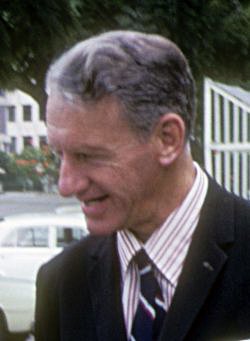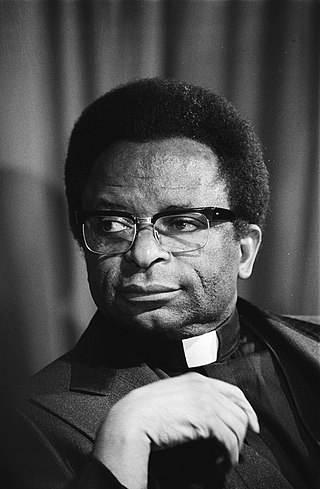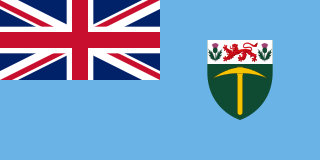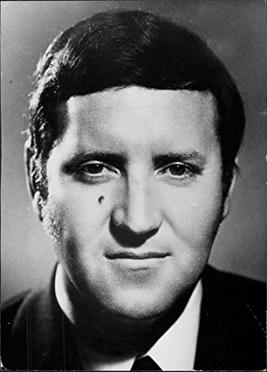
Rhodesia, officially from 1970 the Republic of Rhodesia, was an unrecognised state in Southern Africa from 1965 to 1979. During this fourteen year period Rhodesia served as the de facto successor state to the British colony of Southern Rhodesia, and in 1980 it became modern day Zimbabwe.

Ian Douglas Smith was a Rhodesian politician, farmer, and fighter pilot who served as Prime Minister of Rhodesia from 1964 to 1979. He was the country's first leader to be born and raised in Rhodesia, and led the predominantly white government that unilaterally declared independence from the United Kingdom in November 1965 in opposition to the UK's demands for the implementation of majority rule as a condition for independence. His 15 years in power were defined by the country's international isolation and involvement in the Rhodesian Bush War, which pitted Rhodesia's armed forces against the Soviet- and Chinese-funded military wings of the Zimbabwe African National Union (ZANU) and Zimbabwe African People's Union (ZAPU).

Zimbabwe Rhodesia, alternatively known as Zimbabwe-Rhodesia, also informally known as Zimbabwe or Rhodesia, was a short-lived sovereign state that existed from 1 June 1979 to 18 April 1980, though lacked international recognition. Zimbabwe Rhodesia was preceded by another state named the Republic of Rhodesia and was briefly under a British-supervised transitional government sometimes referred to as a reestablished Southern Rhodesia, which according to British constitutional theory had remained the lawful government in the area after Unilateral Declaration of Independence (UDI) in 1965. About three months later, the re-established colony of Southern Rhodesia was granted internationally-recognized independence within the Commonwealth as the Republic of Zimbabwe.

Rhodesia's Unilateral Declaration of Independence (UDI) was a statement adopted by the Cabinet of Rhodesia on 11 November 1965, announcing that Rhodesia a British territory in southern Africa that had governed itself since 1923, now regarded itself as an independent sovereign state. The culmination of a protracted dispute between the British and Rhodesian governments regarding the terms under which the latter could become fully independent, it was the first unilateral break from the United Kingdom by one of its colonies since the United States Declaration of Independence in 1776. The UK, the Commonwealth, and the United Nations all deemed Rhodesia's UDI illegal, and economic sanctions, the first in the UN's history, were imposed on the breakaway colony. Amid near-complete international isolation, Rhodesia continued as an unrecognised state with the assistance of South Africa and Portugal.

The Rhodesian Front (RF) was a conservative political party in Southern Rhodesia, subsequently known as Rhodesia. Formed in March 1962 by white Rhodesians opposed to decolonisation and majority rule, it won that December's general election and subsequently spearheaded the country's Unilateral Declaration of Independence (UDI) from the Federation of Rhodesia and Nyasaland in 1965, remaining the ruling party and upholding white minority rule through the majority of the Bush War until 1979. Initially led by Winston Field, the party was led by the majority of its existence by co-founder Ian Smith, who would later go following the end of the Bush War and the country's reconstitution as Zimbabwe, it dissolved in 1981 and was succeeded by the Republican Front.

Abel Tendekayi Muzorewa, also commonly referred to as Bishop Muzorewa, was a Zimbabwean bishop and politician who served as the first and only Prime Minister of Zimbabwe Rhodesia from the Internal Settlement to the Lancaster House Agreement in 1979. A United Methodist Church bishop and nationalist leader, he held office for only a few months.

The Rhodesian Bush War, also called the Second Chimurenga as well as the Zimbabwean War of Liberation, was a civil conflict from July 1964 to December 1979 in the unrecognised country of Rhodesia.

Wilfrid Denis Walker was a Rhodesian cabinet minister who later returned to his native United Kingdom. He was known for his monarchist activities and anti-communism and was also company secretary, director and treasurer of the International Monarchist League and its UK subsidiary, the Constitutional Monarchy Association.

The Internal Settlement was an agreement which was signed on 3 March 1978 between Prime Minister of Rhodesia Ian Smith and the moderate African nationalist leaders comprising Bishop Abel Muzorewa, Ndabaningi Sithole and Senator Chief Jeremiah Chirau. After almost 15 years of the Rhodesian Bush War, and under pressure from the sanctions placed on Rhodesia by the international community, and political pressure from South Africa, the United Kingdom, and the United States, the Rhodesian government met with some of the internally based moderate African nationalist leaders in order to reach an agreement on the political future for the country.

The history of Rhodesia from 1965 to 1979 covers Rhodesia's time as a state unrecognised by the international community following the predominantly white minority government's Unilateral Declaration of Independence on 11 November 1965. Headed by Prime Minister Ian Smith, the Rhodesian Front remained in government until 1 June 1979, when the country was reconstituted as Zimbabwe Rhodesia.

The modern political history of Zimbabwe starts with the arrival of white people to what was dubbed Southern Rhodesia in the 1890s. The country was initially run by an administrator appointed by the British South Africa Company. The prime ministerial role was first created in October 1923, when the country achieved responsible government, with Sir Charles Coghlan as its first Premier. The third premier, George Mitchell, renamed the post prime minister in 1933.

Roger Tancred Robert Hawkins was a Rhodesian politician and member of Ian Smith’s cabinet in the years following Rhodesia's Unilateral Declaration of Independence. He was one of the founder members of the Rhodesian Front.

Rowan Cronjé was a Rhodesian politician who served in the cabinet under prime ministers Ian Smith and Abel Muzorewa, and was later a Zimbabwean MP. He emigrated to South Africa in 1985 and served in the government of Bophuthatswana.

Queen of Rhodesia was the title asserted for Elizabeth II as Rhodesia's constitutional head of state following the country's Unilateral Declaration of Independence from the United Kingdom. However, the position only existed under the Rhodesian constitution of 1965 and remained unrecognised elsewhere in the world. The British government, along with the United Nations and almost all governments, regarded the declaration of independence as an illegal act and nowhere else was the existence of the British monarch having separate status in Rhodesia accepted. With Rhodesia becoming a republic in 1970, the status or existence of the office ceased to be contestable.
George Rollo Hayman was a Rhodesian farmer and politician. A member of the House of Assembly, he served in several portfolios as a member of the Cabinet of Rhodesia under Prime Minister Ian Smith. Born in the United Kingdom, he moved to Southern Rhodesia at age four and served as a Royal Air Force pilot in World War II.

David Colville Smith was a farmer and politician in Rhodesia and its successor states, Zimbabwe Rhodesia and Zimbabwe. He served in the cabinet of Rhodesia as Minister of Agriculture from 1968 to 1976, Minister of Finance from 1976 to 1979, and Minister of Commerce and Industry from 1978 to 1979. From 1976 to 1979, he also served Deputy Prime Minister of Rhodesia. He continued to serve as Minister of Finance in the government of Zimbabwe Rhodesia in 1979. In 1980, he was appointed Minister of Trade and Commerce of the newly independent Zimbabwe, one of two whites included in the cabinet of Prime Minister Robert Mugabe.
Ernest Leonard Bulle was an academic and politician who served as a minister in the governments of Rhodesia and Zimbabwe Rhodesia. He served in the cabinet of Rhodesia as joint Minister of Finance and Minister of Commerce and Industry alongside David Smith from 1978 to 1979 as part of the country's Internal Settlement. He continued as commerce minister in the government of Zimbabwe Rhodesia between June and December 1979. First elected to parliament in the 1979 Zimbabwe Rhodesia general election, he stood unsuccessfully in the 1980 general election, which set the membership of the first parliament of the independent Zimbabwe. Bulle was a member of the United African National Council and served as the party's second vice-president.

The Rhodesian Independence Bell, or Rhodesian Liberty Bell, is a replica of the American Liberty Bell which was used in Rhodesia to commemorate their Unilateral Declaration of Independence. It weighed 250 pounds (110 kg) and was made in 1966 in the Netherlands and was last rung in 1978.

The Rhodesia Information Centre (RIC), also known as the Rhodesian Information Centre, the Rhodesia Information Service, the Flame Lily Centre and the Zimbabwe Information Centre, represented the Rhodesian government in Australia from 1966 to 1980. As Australia did not recognise Rhodesia's independence, it operated on an unofficial basis.
The Rhodesian government actively recruited white personnel from other countries from the mid-1970s until 1980 to address manpower shortages in the Rhodesian Security Forces during the Rhodesian Bush War. It is estimated that between 800 and 2,000 foreign volunteers enlisted. The issue attracted a degree of controversy as Rhodesia was the subject of international sanctions that banned military assistance due to its illegal declaration of independence and the control which the small white minority exerted over the country. The volunteers were often labelled as mercenaries by opponents of the Rhodesian regime, though the Rhodesian government did not regard or pay them as such.
















